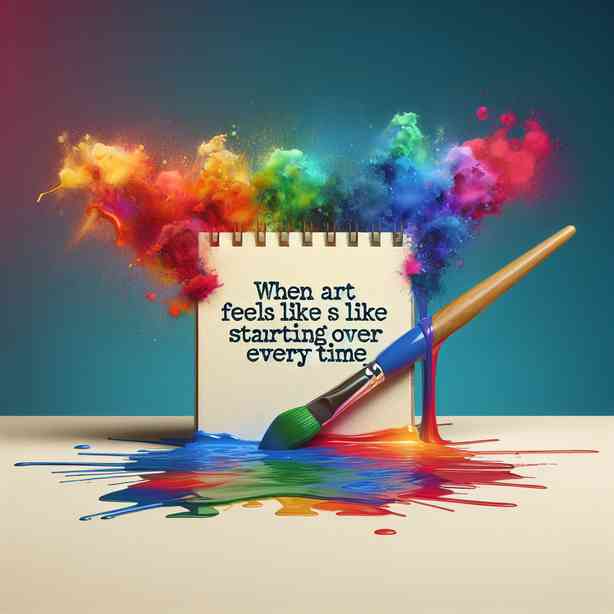
Art, in its myriad forms, has the unique power to evoke deep emotions and provoke thought. However, for many artists, the experience of creating can sometimes feel like starting over time and time again. This sensation might seem daunting, yet it can also be a source of inspiration and growth. The cyclical nature of artistic creation is a journey that reflects the complexities of human experience, and it deserves a closer look.
The notion of starting over in art can often stem from the desire for perfection. Artists frequently encounter the pressure to create a masterpiece, which can lead to feelings of inadequacy or frustration. This internal pressure can be crippling, inhibiting the creative flow and prompting artists to abandon their work or feel compelled to start anew. The anxiety surrounding artistic output is almost universal among creators, and it is crucial to acknowledge that this pressure often has little bearing on the true value of the art itself.
Moreover, the act of beginning anew can signify growth and evolution in an artist’s practice. Each time an artist faces the canvas or picks up their tools, they bring with them the lessons learned from previous works. The mistakes they might perceive as failures are actually stepping stones that contribute to their overall development. Embracing the concept of starting over allows the artist to explore new techniques, styles, and perspectives that enrich their creative arsenal.
This cyclical experience is not limited to visual arts; it applies across all disciplines, including writing, music, and performance. Writers may feel compelled to discard drafts, musicians might struggle with reworking compositions, and performers often face the daunting task of starting their process from scratch. The anxiety surrounding these iterations can sometimes cloud the excitement of creation, yet acknowledging this dynamic can foster resilience and inspire innovative thinking.
Another aspect to consider is the emotional landscape that influences an artist’s work. Mood, life experiences, and external circumstances can shift dramatically, impacting the creative process. An artist who once felt inspired by a particular subject may find that same topic uninspiring weeks or months later. This is a normal part of the artistic journey and highlights the ever-evolving nature of the human condition. By recognizing that emotions and inspiration are fluid, artists can learn to adapt their approach and remain open to new ideas.
Additionally, the digital age has transformed the landscape of art creation and consumption. With platforms that allow for immediate sharing and feedback, artists often find themselves in a continuous cycle of starting over. The influx of information and inspiration available online can lead to comparison with others’ work, which can be both beneficial and harmful. While it presents opportunities for collaboration and growth, it can also exacerbate feelings of inadequacy. Artists must navigate this double-edged sword, finding a balance between inspiration and comparison.
Importantly, the communal aspect of art cannot be overlooked. Engaging with fellow artists or creative communities can alleviate the isolating feeling of perpetual reset. Sharing struggles, successes, and the process of creation can foster connections that provide support and validation. Understanding that many artists grapple with similar feelings can normalize the experience and encourage individuals to push through their creative blocks.
The potential for collaboration also emerges when artists embrace the idea of starting over. Collaborating with others can lead to unexpected discoveries, new ideas, and fruitful experimentation. Each collaborator brings their unique perspective and style, adding new layers to the artwork. This exchange can invigorate the creative process, inspiring veteran artists and newcomers alike to approach their work with renewed enthusiasm.
Reflection plays a critical role in the recording and understanding of one’s artistic journey. Keeping a journal or documenting progress can help artists track their development over time. By revisiting older pieces, artists can gain insights into their growth and see how past struggles have shaped their current practice. This process can mitigate the anxiety tied to starting over, as it reinforces the idea that each iteration, whether perceived as a failure or success, contributes to the larger narrative of their artistic identity.
Another beneficial approach is to frame each new undertaking as an experiment rather than a definitive statement. Adopting a mindset of curiosity and playfulness can alleviate the pressure to produce perfection. When artists view their work through the lens of exploration, they enable themselves to take risks and embrace the possibility that not every piece will fully resonate. This shift in perspective can unlock creativity and lead to unexpected and delightful outcomes.
Lastly, understanding that art is inherently subjective is pivotal. No piece of art will resonate with everyone, and each viewer brings their unique perspective and interpretation to the work. This reality can liberate artists from the burden of seeking universal approval, allowing them to create more authentically. By focusing on what feels true to themselves rather than striving for perfection, artists can establish a deeper connection to their work, which ultimately translates into richer, more genuine art.
In summary, the feeling of starting over in art, while often daunting, is an integral part of the creative journey. Artists must embrace the cyclical nature of creation, using each reset as a learning opportunity rather than a setback. Through self-reflection, collaboration, and a willingness to explore, artists can navigate the challenges of creativity with resilience and innovation. Acknowledging and accepting the emotional fluctuations inherent in the artistic process will not only enrich the artist’s practice but also deepen their connection to the art and the audience that experiences it. Embracing the journey of starting over can ultimately lead to profound discoveries, personal growth, and, above all, a lasting love for the creative process itself.


